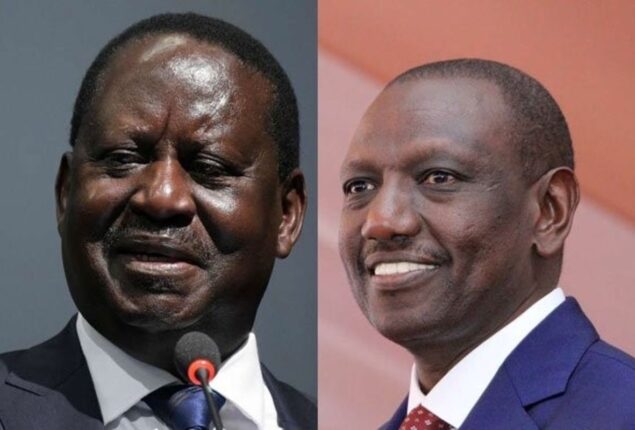Kenyan election, the Rift Valley steps up security
Extra security has been deployed throughout the Rift Valley region of Kenya...

Raila Odinga and William Ruto for Kenya: Elections 2022
Kenyans are voting for their new president in 2022 elections after a contentious campaign dominated by discussions about living expenses, unemployment, and corruption.
After serving the legally restricted two years, outgoing President Uhuru Kenyatta is endorsing one-time rival Raila Odinga, 77, to replace him.
He made the choice after a disagreement with Deputy President William Ruto, 55, who had anticipated to be supported.
Over 22 million Kenyans have already registered to vote.
There are numerous other elections taking place at the same time, and a mix-up of ballot papers in certain locations for some of those ballots has created new concerns about the main election’s organisation.
Polls are open for 11 hours beginning at 6:00 a.m. local time (03:00 GMT). Anyone who is still in line at the end of the voting period will be permitted to vote.
The results of the 2017 presidential election were overturned after the Supreme Court found that the electoral commission had not obeyed the law in terms of electronic transfer of vote counts from polling locations.
The judges found that “illegalities and irregularities” had occurred.
Mr Kenyatta won a re-run, but Mr Odinga, the leading opposition candidate at the time, boycotted it.
Wafula Chebukati, the head of the electoral commission who was also in charge of the 2017 election, has repeatedly sought to convince Kenyans that his staff would be up to the job this time.
However, Monday’s logistical issues have added to his workload.
This election seems to be a close battle between frontrunners Mr Odinga and Mr Ruto.
Mr Odinga, a long-serving opposition leader known to his fans as Baba (“father”), is standing for president for the sixth time. Mr Ruto, who has attempted to emphasise his connection with ordinary Kenyans by referring to himself as a “hustler,” will be running for the president for the first time.
David Mwaure and George Wajackoya are two more contestants in the campaign.
Despite the fact that the campaign is driven by topics, ethnic allegiance may have a role in influencing how people vote.
For the first time in the country’s multi-party history, none of the major contenders are from the country’s biggest ethnic group, the Kikuyu.
But, knowing how important those votes are, both have picked Kikuyu running mates.
To win the presidential election in the first round, a candidate must have:
more than half of all votes cast throughout the nation at least 25% of votes cast in at least 24 counties
Voters will also elect MPs and senators to the national parliament, county governors and county assembly members, and 47 women’s representatives to the National Assembly.
On election day, voters’ fingerprints will be scanned to verify their identification, although a written register will be available if the computers fail.
Each voter will subsequently be handed color-coded ballot papers for each election, which they will mark in a private booth before dropping in the appropriate voting boxes.
Counting will begin at polling places immediately after voting concludes. Officials will then photograph the final tally and email it to the constituency and national counting centres.
To maintain openness, the media, political parties, and civil society organisations have been invited to compile their own counts based on the final results given at over 40,000 voting locations.
However, only the electoral commission may proclaim the presidential election winner after authenticating the physical and digital forms submitted to the national tallying centre.
The major presidential contenders have pledged to accept the election results.
Catch all the World News, Breaking News Event and Latest News Updates on The BOL News
Download The BOL News App to get the Daily News Update & Follow us on Google News.